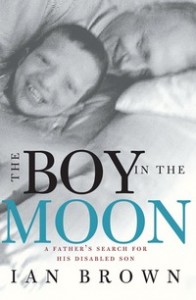Guest Post by Mary E. McIntyre
Twenty-one years ago, my brother and his wife had twin sons with cerebral palsy. The son who was more severely affected died at 17 years, of complications from his disability. The remaining twin is wheelchair bound, unable to look after his physical needs. Though he can talk slowly and even share humour, that humour is more typical of a 10-year-old who laughs at fart jokes than a 21-year-old.
From the sidelines over the years I’ve observed and empathized with the stresses these exhausted parents faced while caring for seriously disabled children, including the emotional search for a care home in which to place them. So Ian Brown’s award-winning memoir, The Boy in the Moon: A Father’s Search for His Disabled Son, resonated with me, and I was anxious last month to attend Writers’ Community of Durham Region (WCDR) breakfast meeting where he was guest speaker.
 Brown and his wife Johanna have a 15-year-old son named Walker. His rare disability is CFC (cardio-facio-cutaneous syndrome), a genetic mutation only recently identified by the scientific community. Walker is globally delayed, non-speaking, sickly, and has a tendency to hit himself. He can walk, but cannot express toileting needs or pay attention to much more than repetitive tactile sensations. There are only an estimated 150 to 300 cases worldwide and, as Brown laments, resources for parents of these children are limited. His memoir chronicles his efforts to understand Walker, and indeed the plight of all families living with CFC—efforts that were disappointing and painful, but that ultimately resulted in discovery and acceptance.
Brown and his wife Johanna have a 15-year-old son named Walker. His rare disability is CFC (cardio-facio-cutaneous syndrome), a genetic mutation only recently identified by the scientific community. Walker is globally delayed, non-speaking, sickly, and has a tendency to hit himself. He can walk, but cannot express toileting needs or pay attention to much more than repetitive tactile sensations. There are only an estimated 150 to 300 cases worldwide and, as Brown laments, resources for parents of these children are limited. His memoir chronicles his efforts to understand Walker, and indeed the plight of all families living with CFC—efforts that were disappointing and painful, but that ultimately resulted in discovery and acceptance.
What most impressed me about Brown—both in his book and in his presentation—was his honesty. He didn’t sugar-coat the exhausting effect on his family of round-the-clock caregiving. For years I’d watched Brown introduce documentaries on TVO. The man looked tired. Now I understand why. Sleeplessness is a common condition in the world of CFC families. Brown and his wife alternated nights to placate Walker so they each could get some uninterrupted sleep. (They felt fortunate if they slept for even four hours.) A dependable daytime nanny/caregiver named Olga was an invaluable resource that they, and Walker, revered. But with a young daughter as well as a disabled son, with busy careers, deadlines and travel, the lines of responsibilities blurred. Resentments took their toll on the author’s marriage. Sadly, a high percentage of parents with disabled children don’t make it together. The fact that Brown and his wife are still united is a testament to their strength and determination, and their love for each other and both their children.
A journalist who is naturally curious and investigative, Brown was nagged by questions from the time of Walker’s earliest diagnosis. “What is the value of a life like this—a life lived in the twilight, and often in pain?” he writes. “What is the cost of his life to those around him? Sometimes watching Walker is like looking at the moon; you see the face of the man in the moon, yet you know there’s actually no man there. All I really want to know is what goes on inside his off-shaped head, in his jumped-up heart.” His longtime editor and friend Cathrin Bradbury convinced him to write about Walker, and Globe and Mail editor at the time, Carl Wilson, reviewed early sections for a series in the newspaper, which Brown later developed into a book.
The author’s passion to share what he has learned is palpable in the room at the WCDR presentation. With humour and sadness he introduces us to CFC: its range of symptoms, and how early diagnosis, research funding and humanizing care are elusive, time-consuming and expensive to pursue. Brown’s efforts to help his son and understand his condition led him to reach out to other CFC parents, to doctors and scientists and to administrators of cutting-edge treatment facilities. He’s unashamed of his feelings of guilt, wondering if he should have done more, earlier. He’s unashamed of the intimacy he feels between himself and his son. He’s unashamed of the distractions he faced in worrying about his son—distractions that often impeded his ability to focus on his wife, his daughter, his work, his social life and his friendships. Walker was all-consuming.
Yet, when briefly Walker is able to relax against him, Brown sees these rare moments as gifts of love. And in many ways this memoir is a love letter to his son.
Brown’s search for balanced alternatives for his boy’s care was tireless, but eventually the couple was forced to acknowledge that Olga was aging, that their daughter should not be responsible for her brother, that they themselves were worn out. The Boy in the Moon, now 15 years old, has for five years lived in a specialized facility, spending 3 days of every 14 living with his family at home. Their decision to relinquish Walker’s full-time care was a bittersweet one that involved a difficult transition for Brown and his wife and daughter to accept.
What also impressed me about Ian Brown was his ability to acknowledge what he gained from knowing Walker, the lessons he learned about himself as a father and as a human being. Walker, he says, made him better in both roles. His boy taught him patience, acceptance, boundless love, and how to feel joy in small miracles. Walker’s journey of living with a severe disability became one with Brown’s journey to advance his awareness and understanding, and to share what he learned. As a result, The Boy in the Moon gives voice to the plight of all disabled individuals, their parents, their doctors, researchers and caregivers.
The audience gave Brown a standing ovation following his presentation, a fitting tribute to a father and author whose story is provocative, educational and hopeful. The best memoirs are written to inspire and even transform us as readers, and there’s no doubt that Ian Brown’s does both.
* * *
 Ian Brown has won impressive awards for The Boy in the Moon: the 2010 British Columbia’s National Award for Canadian Non-fiction ($40,000) and the 2010 Canadian Nonfiction Charles Taylor Prize ($25,000). He is also recognized for a string of journalistic accomplishments: host of The Human Edge and The View From Here on TVOntario; host at CBC Radio One, including for Later the Same Day, Talking Books and Sunday Morning; business writer at Maclean’s and the Financial Post, feature reporter for The Globe and Mail and a freelance journalist for magazines including Saturday Night; editor of What I Meant to Say: The Private Lives of Men, a 2006 collection of 29 essays by prominent Canadian writers; contributor to the U.S. public radio program This American Life; and author of two other published books, Freewheeling and Man Overboard.
Ian Brown has won impressive awards for The Boy in the Moon: the 2010 British Columbia’s National Award for Canadian Non-fiction ($40,000) and the 2010 Canadian Nonfiction Charles Taylor Prize ($25,000). He is also recognized for a string of journalistic accomplishments: host of The Human Edge and The View From Here on TVOntario; host at CBC Radio One, including for Later the Same Day, Talking Books and Sunday Morning; business writer at Maclean’s and the Financial Post, feature reporter for The Globe and Mail and a freelance journalist for magazines including Saturday Night; editor of What I Meant to Say: The Private Lives of Men, a 2006 collection of 29 essays by prominent Canadian writers; contributor to the U.S. public radio program This American Life; and author of two other published books, Freewheeling and Man Overboard.
Watch Allan Gregg in conversation with Ian Brown here.
Canada Reads: True Stories
Based on reader votes, The Boy in the Moon: A Father’s Search for His Disabled Son has made the Canada Reads: True Stories “Top 40” list. To vote for up to 5 of your favourite nonfiction books and help Canada Reads select its “Top 10,” click here.